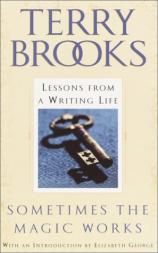Sometimes the Magic Works
Review
Sometimes the Magic Works
SOMETIMES THE MAGIC WORKS is Terry Brooks's personal tribute to the
writing life. I have had no prior interest in the fantasy genre,
but I am now a Brooks fan and will comb the stacks for his
bestselling titles. His love for the writing craft glimmers like a
diamond throughout the book.
In the early chapters, he pictures the writer as observer, at times
detached from the reality of mundane experience. He surmises that
an author gathers smoke when appearing to "not be all there" and
that smoke contains the meat of his creative imaginings, out of
which comes perspective and a viewpoint. He contends that all
writers must step outside the real world to be successful.
Each chapter in SOMETIMES THE MAGIC WORKS is prefaced by a
quotation from Brooks that summarizes its content. Early in the
book, he reveals his experience with first publication. "Luck with
a capital "I" plays a large part in his success story and confirms
his belief that "sometimes the magic really works." It is here
where he talks about the couple who first believed in his work,
editors Lester and Judy-Lynn del Rey. References are made to them
throughout the remainder of his story.
"It's Not About You" is a section devoted to Brooks's first
experience at a book signing. It is humorous and witty, a
philosophical statement about the author's role in the event. He
emphasizes that the reading public has the option to buy or not to
buy. The writer's ego need not interfere when would-be buyers chat,
then walk away without a purchase. Publicity tours are, in his
opinion, necessary and the opportunity to thank the reading
public.
Several chapters deal with Brooks's first experience with
screenwriting, a bitter pill in the memory bank. Relegated to the
post of distant observer, he was denied active participation in the
filming process. For many years he refused to entertain a
repeat.
The meat of SOMETIMES THE MAGIC WORKS lies in the pages offering
the writer real ideas, an aid in finding his own magic. Brooks
states that, for him, outlining is a must. He spends considerable
time in justifying the method. He confirmed my preconceived notion
that the outline is a worthwhile tool. The simple formula he gives
for success is "Read, Read, Read. Outline, Outline, Outline. Write,
Write, Write. Repeat." The formula allows him to do one draft and
one rewrite before the work is done.
The outline point made, he continues advice with his ten rules for
writing in subsequent pages. Each idea, from "Write What You Know"
to "Don't Bore The Reader," is fully developed, with examples from
Brooks's own writing. He uses an impromptu writing exercise to
illustrate each point, a glimpse into his vast imagination.
Following the rules section, the author explains that a day with
his small grandson, Hunter, taught him volumes about the writing
life, or rather what it should be as an observer of real life. For
him, the writer must live outside the moment to make progress on
his journey to success. To write fiction, one must have
determination, instinct and passion.
Brooks sums up the words behind his title in his final statement,
"Writing. Is life. Breathe deeply of it." SOMETIMES THE MAGIC WORKS
is a fitting tribute to his life's passion.
Reviewed by Judy Gigstad on January 23, 2011
Sometimes the Magic Works
- Publication Date: March 4, 2003
- Genres: Language Arts, Nonfiction
- Hardcover: 208 pages
- Publisher: Del Rey
- ISBN-10: 0345458281
- ISBN-13: 9780345458285





